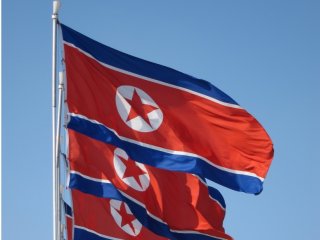Warning, America: North Korea Torpedoes China, South Korea Outreach
"Pyongyang’s ongoing nuclear efforts are pushing Seoul and Beijing together in their opposition to a nuclear North Korea in ways that are costly to the country's leadership."
Last week it seemed possible that North Korea was ready for the first time under Kim Jong-un to reach out in parallel to its closest neighbors, South Korea and China. Inter-Korean dialogue had resumed last Friday at the vice-minister level in Kaesong. At the same time, Pyongyang sent Kim Jong-un’s favorite all-female Moranbong band to Beijing as a signal of potential willingness to re-open normal relations between Pyongyang and Beijing. However, both initiatives appear to have foundered because of North Korea’s commitment to its nuclear weapons program, underscoring the country’s diplomatic isolation.
At negotiations in Kaesong, South Korea sought to regularize inter-Korean family reunions while North Korea sought the re-opening of inter-Korean tourism at Mount Kumgang. Hyundai Asan’s Mount Kumgang complex has been shuttered for over seven years following the shooting death of a South Korean tourist who reportedly strayed from designated tourist sites (but the complex was used last fall as the venue for inter-Korean family reunions). South Korean president Park Geun-hye’s Dresden declaration envisaged humanitarian cooperation as the initial step toward trust-building in inter-Korean relations, to be followed by expanded inter-Korean economic cooperation in the next phase. Although the demarcation between the phases was ambiguous in the speech, the Park administration is reportedly insisting that the price for large-scale economic cooperation such as Mount Kumgang’s re-opening is North Korea’s renewed commitment to denuclearization.
Meanwhile in Beijing, the Moranbong band conducted rehearsals for an exclusive performance but mysteriously cancelled and flew back to Pyongyang. This development was particularly surprising given that the North Korean and Chinese media had been playing up the performance as a symbol of renewed warming of relations between Pyongyang and Beijing, adding embarrassment on both sides. Media rumors regarding cause of the abrupt cancellation have been rife and include the North Korean cover story that such a performance was unthinkable on the eve of memorial ceremonies surrounding the fourth anniversary of the death of Kim Il-sung.
Others analyzed that rude South Korean media questions to band leader Hyun Song-wol, who had been rumored to have been executed for appearing in illicit sex tapes and for incurring the jealousy of her rival and Kim Jong-un’s wife, Ri Sol-ju, had insulted the “highest dignity” of Kim Jong-un. Still, others suggested that China refused to send high-level Politburo members to attend the performance as a way of expressing dissatisfaction with Kim Jong-un’s claims that North Korea had developed a hydrogen bomb.
If both inter-Korean relations and improvement of Sino-DPRK relations have foundered as a result of North Korea’s continued commitment to nuclear development, it would be powerful evidence that Pyongyang’s ongoing nuclear efforts are pushing Seoul and Beijing together in their opposition to a nuclear North Korea in ways that are costly to the country's leadership. This message follows efforts to convince North Korea to defer its missile testing in the run-up to last October’s celebration of the seventieth anniversary of the Korean Worker’s Party’s founding attended by fifth-ranking Chinese Communist Party Politburo member Liu Yunshan.
North Korean efforts to test Seoul and Beijing’s resolve are set to incur even higher costs. South Korean foreign minister Yun Byung-se last year called a fourth North Korean nuclear test a “game-changer,” and Xi Jinping has consistently and publicly called for North Korea’s denuclearization.
This past weekend, with the simultaneous breakdown of North Korean efforts to reach out to its two most important neighbors and potential economic partners, both Seoul and Beijing have sent a powerful signal that North Korea’s alternatives to a return to denuclearization diplomacy are limited and costly to the North. Kim Jong-un’s idea of how to move forward seems premised on the idea that his nuclear deterrent is the only way to create a secure environment for North Korea’s economic development. Yet, his neighbors clearly believe North Korea’s economic survival and prosperity is only feasible if North Korea reverses course and pursues denuclearization.
As North Korea prepares for a historic party conference in May of 2016, Kim Jong-un must grasp and resolve the contradiction between his conception of the conditions for North Korea’s survival and his neighbors’ conceptions of the conditions for North Korea’s prosperity. Otherwise, both North Korea’s survival and its prosperity would be in jeopardy.
Scott A. Snyder is Senior Fellow for Korea Studies and Director of the Program on U.S.-Korea Policy at the Council on Foreign Relations. This article originally appeared in Asia Unbound.
Image: Flickr/John Pavelka

